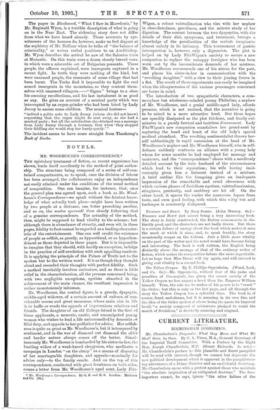CURRENT LITERATURE.
BIRMINGHAM ECONOMICS.
Mr. Chamberlain's Proposals : What they Mean and What We Shall Gain by them. By C. A. Vince, MA., General Secretary of the Imperial Tariff Committee. With a Preface by the Right Hon. Joseph Chamberlain, M.P. (Grant Richards. is. net.)— Mr. Chamberlain's preface to this plausible and fluent pamphlet will be read with interest, though we cannot but deprecate the new political development which is apparent in the pamphleteer- ing adventures of a Prime Minister and an ex-Colonial Secretary. Mr. Chamberlain opens with a protest against those who maintain "the absolute inspiration of an antiquated doctrine." The free- importers cannot, he says, ignore "the utter failure of the prophecies by which the agitation, which ultimately gave us our present system, was accompanied and supported." We do not ignore, we merely regret, as the keenest thinkers in Europe regret, the delayed fulfilment of those prophecies ; and it must be remembered that Free-trade was not precipitated by any such prophecies. England needed it, and needs it still. Mr. Chamberlain goes on to ask what Mr. Cobden would have said had he foreseen the modern protection of English labour through the efforts of Trade-Unions and social reformers. The answer is that Mr. Cobden knew perfectly well that this limitation to the pure doctrine of Free-trade in this country was not only inevitable, as the result of a growing sense of national responsibility, but that it was in his day already in existence. The first Factory Act dates from 1802. Mr. Chamberlain's further statement that "our exports have been practically stationary during the last twelve years " is a misapprehension of the facts. Even Mr. Balfour admits that we are not " living on our capital," and if we are not, we must pay for our imports by our exports. Mr. Chamberlain will scarcely suggest that our imports are stationary. He harps on the necessity of having something "to bargain with." Surely the beat thing we can have to bargain with is industrial and technical methods excelling those of all other nations. Next, " our free-food friends will have to be a little more definite and a little more accurate." These are desirable qualities, we admit, but a bad example is set us by our "taxed-food friends." Mr. Balfour's references to bleach and to Bradford goods were a little wanting in accuracy and definition and Mr. Vince in this pamphlet is more convincing than correct., As the Westminster Gazette of Monday shows, the argument on
p. 32 is open to criticism of the severest kind. Mr. Vince in his calculations (and Mr. Chamberlain in his speeches) has neglected the effect of the proposed taxes upon the price of untaxed meat, which forms three-fifths of the meat consumed. Hence "the maximum effect of the new taxes on foods would be," not, as Mr. Vince says, 2s. 6d., but 4e. Mr. Chamberlain's proposal to transfer the burden to the necessaries of life from the non-necessaries, such as tea, would, we maintain, "be disastrous,"—almost as disastrous as to transfer in India the Opium-tax to cereals. We cannot believe that any of these doubtful expedients are necessary to increase our Colonial trade. Mr. Chamberlain admits the present rapid growth of that trade. Mr. Vince on p. 41 significantly declares that " we owe cheap bread to mechanics, not to politics." That admission must never be forgotten. Our industrial salvation to- day belongs to the realm of science and method, and not to the realm of politics. Mr. Chamberlain concludes his preface by warmly resenting "the charge of neglecting the interests of the industrial population." We have not attacked his good faith. His fundamental economic heresies are the target at which we aim.















































 Previous page
Previous page